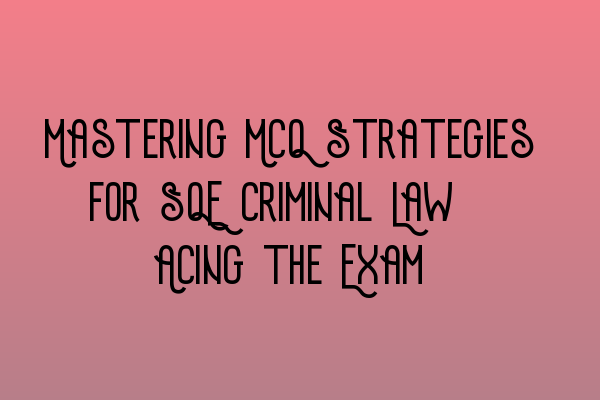Mastering MCQ Strategies for SQE Criminal Law: Acing the Exam
Disclaimer: This article is written by an expert solicitor, writer and SEO expert at SQE Criminal Law & Practice Law UK.
If you’re preparing for the SQE Criminal Law exam, mastering multiple-choice question (MCQ) strategies can significantly improve your chances of acing the exam. MCQs test your knowledge of various aspects of criminal law and require a strategic approach to ensure accurate and efficient answers. In this article, we will provide you with essential tips and techniques to help you navigate through MCQs with confidence and achieve a high score.
1. Understand the Structure of MCQs
Before diving into the strategies, it’s important to understand the structure of MCQs. Each question usually has a stem, which presents a problem or scenario, and several response options. Your task is to select the most appropriate or correct response from the available options.
2. Read the Question Carefully
One common mistake candidates make is not reading the question carefully. Take your time to understand the problem or scenario presented in the stem. Pay attention to specific details, relevant keywords, and any constraints mentioned. This careful reading will help you identify the main issue and eliminate incorrect response options.
3. Analyze Response Options
After understanding the question, analyze each response option. Carefully consider their relevance, accuracy, and applicability to the given problem or scenario. Eliminate options that are clearly incorrect or unrelated. Narrow down your choices to the most plausible options.
4. Use Process of Elimination
The process of elimination is a valuable technique to eliminate incorrect response options. Start by identifying options that you are certain are incorrect. Cross them out or mentally discard them. By eliminating options that cannot be correct, you increase your chances of selecting the right answer.
5. Identify Keywords
Keywords play a crucial role in MCQs. Pay attention to keywords in both the question stem and the response options. Look for keywords that indicate specific elements or principles of criminal law. By recognizing and understanding these keywords, you can align them with your knowledge and choose the most appropriate response.
6. Avoid Absolute Statements
Be cautious of response options that include absolute statements like “always” or “never.” Criminal law often involves complex scenarios where absolute statements are rarely accurate. Look for response options that present a balanced or nuanced approach instead.
7. Practice with Mock Exams
Mock exams are excellent resources for practicing MCQ strategies. They familiarize you with the exam format, help you identify areas of improvement, and refine your time management skills. Use the related articles below for additional reading and access to mock exams to enhance your preparation:
- Legal Representation for Delaware LLCs in the UK: Expert Advice
- Ensuring Ethical Business Practices: Delaware’s Code of Conduct
- Legal Challenges for UK Businesses in the U.S.: Strategies for Overcoming Hurdles
- UK Criminal Law: An In-Depth Analysis of the British Legal System
- Legal Challenges for UK Businesses in the U.S.: Strategies for Overcoming Hurdles
By practicing with mock exams, you can simulate the exam environment, time constraints, and improve your ability to select the correct response under pressure.
8. Focus on High-Yield Topics
Identify and prioritize high-yield topics that are frequently tested in SQE Criminal Law exams. Familiarize yourself with the fundamental principles, statutes, case law, and key concepts related to these topics. By focusing on high-yield areas, you can allocate your study time more effectively and increase your chances of answering related MCQs correctly.
9. Time Management
Effective time management is crucial during the exam. Allocate a specific amount of time for each question based on its difficulty level. If you’re stuck on a question, move on and come back to it later if time allows. Don’t get stuck on one question and risk not completing the exam within the allotted time.
10. Review and Practice Regularly
Consistent revision and practice are key to mastering MCQ strategies for SQE Criminal Law. Regularly review the topics, principles, and concepts, and reinforce your understanding through practice questions and mock exams. This approach will enhance your knowledge retention and familiarize you with the different question formats that may appear in the actual exam.
By implementing these strategies and dedicating ample time for preparation, you can confidently approach the SQE Criminal Law exam and increase your chances of achieving a top score. Incorporate the related articles mentioned above into your reading to gain a deeper understanding of the subject matter.
Remember, efficient MCQ strategies, combined with a strong foundation in criminal law, are the keys to success in the SQE Criminal Law exam. Good luck!
